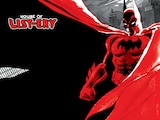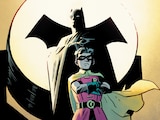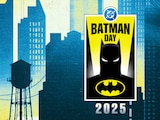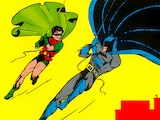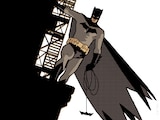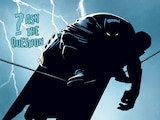Krypton, when you think about it, should be the ultimate cautionary tale. A planet of abundance with an advanced society that had progressed well beyond fulfilling their basic needs, they’re quite a bit like us. And much like us, they also possessed great hubris, which over time led to their planet’s destruction.
That hasn’t yet happened to Earth, but it really does feel that short of making some hard, planetwide decisions, we may eventually be going that way. The similarities between the civilizations of Earth and Krypton certainly haven’t gone unnoticed by the Kal-El of Jason Aaron and Rafa Sandoval’s Absolute Superman, in part because he spent long enough on his home planet to get a taste of it. He witnessed the arrogance of Krypton’s wealthy and elite up close as both of his brilliant parents were disgraced for questioning the status quo and pointing out a few inconvenient truths. And he experienced the plight of the working class, as Jor-El and Lara were left to scrimp by on the fringes of society, finding whatever work they can under an oppressive Science League.
While much of this new Superman’s story is yet to be revealed, what’s apparent from the first issue is that this Superman doesn’t seem all that interested in being a champion for everybody. Maybe he’ll get there eventually, but for now, this Kal-El is clearly a champion of the working class.

What’s interesting about that is DC’s new Absolute Universe has promised superheroes reimagined to better address the problems and injustices of today—heroes who remain true to who they are at the core, but who may be dramatically different otherwise. It’s hard to argue this new Man of Steel doesn’t fit that bill, but in some ways, it’s also a return to his very beginning.
I’ve written about this before, but if you open up Action Comics #1, on the very first page you’ll see our hero described as, “Superman, champion of the oppressed! The physical marvel who had sworn to devote his existence to helping those in need!”
It’s how Jerry Siegel and Joe Shuster described him the first time we see him in his suit—a champion of the oppressed. Not a champion of humanity or of the innocent—of the oppressed.
Yes, over the past nine decades, the Man of Steel has become better defined. He eventually became a hero for all of us and symbol of the inherent goodness that we should strive for. But as described by his creators, he began as a fighter against oppression and a champion for the most vulnerable of us. And in Absolute Superman, so he is again.

It puts an interesting spin on him as a hero. The Superman in the core DC Universe fights for truth, justice and a better tomorrow, but the Absolute take on Superman suggests that truth and justice may sometimes be irreconcilable. After all, the profit-driven corporations that exploit workers like the Brazilian diamond miners we meet in Absolute Superman #1 technically are operating within the law. For generations, the idea of “justice” in comic books meant punishing criminals, not law-abiding citizens. But we’re in a more aware time now. Laws aren’t always just, and just because what you’re doing isn’t illegal doesn’t mean it’s not exploitative or oppressive. That’s an undeniable truth, but is it justice to then fight for the exploited? Certainly the exploiters—in this case the sinister Lazarus Corp—wouldn’t see it that way and it’s likely Brazil’s criminal justice system wouldn’t either.
In Aaron and Sandoval’s first chapter, Superman at first tries to thread that needle by not initially fighting for them. Instead, he just helps them. He stealthily saves the minors by mining and crushing the ore they were responsible for into diamonds, preventing them from having to work in an asbestos-tainted mine. But when the Lazarus Corp and their brutal Peacemakers violently demand answers from the miners, Superman springs into action, taking them all on in a much less polished and far rougher way than we’re accustomed to seeing from him (notably, he still refuses to kill).

This is the first time Aaron and Sandoval’s Superman has taken action like this, and it’s clear he has his doubts. We can only assume they will lessen as the series goes on, especially if he remembers what the miner João told him prior to the confrontation. As João invites him to join their celebration prior to their shift in the mine, a somber Superman says to him, “I’ve seen the wonders of your world. And I’ve seen a lot of places like this. Industries that run on suffering. How do you know which is the truth?”
Without a beat, João replies, “You know. When you have what is worth fighting for, that is the truth.”
Justice may evolve. It may be subject to the individual biases and perspectives of those defining and doling it out. But there’s just one truth.
Absolute Superman couldn’t shout it more loudly—the oppressed are worth fighting for. It was true when the first issue of Action Comics hit the stands and it’s still true today, over 85 years later. Now, like then, Superman remains a champion of the oppressed. We’re just a lot more clear-eyed about who’s doing the oppressing now.
Absolute Superman #1 by Jason Aaron, Rafa Sandoval and Ulises Arreola is now available in print and as a digital comic book.
Tim Beedle covers movies, TV and comics for DC.com, writes our monthly Superman column, "Super Here For...", and is a regular contributor to the Couch Club, our recurring television column. Follow him on Bluesky at @TimBeedle.
NOTE: The views and opinions expressed in this feature are solely those of Tim Beedle and do not necessarily reflect those of DC or Warner Bros. Discovery, nor should they be read as confirmation or denial of future DC plans.



